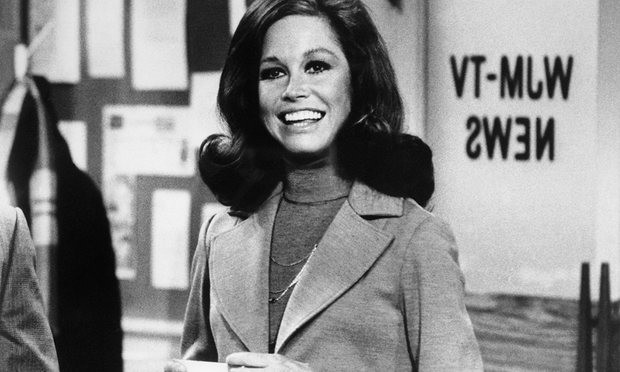I’m a bit too young to have had “The Mary Tyler Moore Show” be about me and my life, but I do clearly remember watching, learning, and understanding what this woman meant to the world beyond the series.
This woman was a fucking kick-ass groundbreaker and she did it all with a smile. “The Mary Tyler Moore Show” was brilliantly subversive. It was the ‘70s, and TV was still all about women being “likable”, yet this show — which was created by men — was really reflective of the times. The series was also ahead of its time. According to the Atlantic, one third of the writers in 1973 were women, something that many writers’ rooms in 2017 don’t have. These women were able to share what it was like to be a working woman in the ‘70s and many went on to have significant careers, like Treva Silverman, who became the first solo woman to win an Emmy for writing on a comedy series.
What I remember most about Mary Tyler Moore is that her company was named after her, and that meant that she was important. I remember watching her and Grant Tinker and seeing their partnership as creative TV people. I remember she introduced us to the character of Rhoda in “The Mary Tyler Moore Show,” who quite honestly, was a lot more like me than Mary was (messy, loud, and Jewish).
She talked about diabetes and alcoholism when no one did. And looking back on her life now that she is gone, there are several films that I remember vividly affecting me. She slayed in the breathtaking “Ordinary People” in 1981, showing that she could be serious, and proved that she was still one of the best in the 1996 classic “Flirting with Disaster.”
But I also remember the other ones. I remember ugly crying while watching “Six Weeks” and being blown away when she played Betty Rollin on TV in “First You Cry” because it was the first time I had seen a depiction of a woman with breast cancer, and I also remember loving her and Christine Lahti in “Just Between Friends.”
I would imagine that millennials don’t know much about Mary Tyler Moore since she hasn’t been on our screens with regularity in some time, but the most important thing for them — and all of us — to understand is that the things that Mary did in the 1970s on “The Mary Tyler Moore Show” paved the way for all TV today, and her impact was felt far beyond the small screen. The show centered on a woman who was single. She cared about her career. She had female friendships. She had sex. She took the pill. And in doing these things, she changed our entertainment industry and the perception of who women could be, and what kind of lives they could lead.
So while she might have captured the hearts of millions around the world with her smile, Mary Tyler Moore leaves behind an important legacy for generations of women to build on.







